Amy Sue Nathan's Blog: Women's Fiction Writers, page 27
January 28, 2015
Author Interview: Wendy Lee Say If You Don’t Take Your Work Seriously, No One Else Will
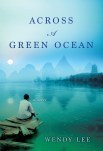 Author Wendy Lee weaves Chinese culture, past and present, into her new novel, ACROSS A GREEN OCEAN. As Wendy notes, it’s important to weave our personal stories into the threads of our fiction. That’s what makes the universal, personal. That’s what makes stories matter to their authors. And like Wendy says, “If you don’t take your work seriously, no one else will.”
Author Wendy Lee weaves Chinese culture, past and present, into her new novel, ACROSS A GREEN OCEAN. As Wendy notes, it’s important to weave our personal stories into the threads of our fiction. That’s what makes the universal, personal. That’s what makes stories matter to their authors. And like Wendy says, “If you don’t take your work seriously, no one else will.”
Please welcome Wendy Lee to Women’s Fiction Writers!
Amy xo
Author Wendy Lee Say If You Don’t Take Your Work Seriously, No One Else Will
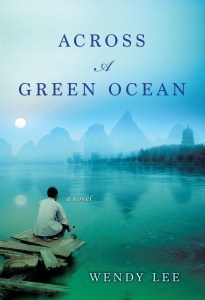 Amy: Welcome to WFW, Wendy, and congratulations on the publication of your second novel, ACROSS A GREEN OCEAN.��
Amy: Welcome to WFW, Wendy, and congratulations on the publication of your second novel, ACROSS A GREEN OCEAN.��
Wendy: Thank you for having me!
Amy: Where did the title of the novel originate? Was it something you knew right away on your own? A collaborative effort? Did it pop into your head one day or was it the result of endless brainstorming sessions? Can you share with us if there were any other titles?��
Wendy: The title comes from a line in the book and refers to a couple of things: a place in China called Qinghai Province, which literally means ���green sea���; and the Pacific Ocean that separates China and America, which I think remains forever in the minds of some immigrants. It pretty much was the only title that came to mind and the only one I considered. Fortunately, no one asked me to change it.
Amy: How did you come up with the idea for the novel? Was it a spark? A character? Something personal?
Wendy: I had spent a few years working on a different novel, about a Chinese-American family with three daughters where the father has passed away, and something about it just wasn���t clicking. The daughters come back home, they grieve, and that was it. I wondered what it would be like if one of the characters wasn���t so much like me–which turned out to be Michael, the gay son in ACROSS A GREEN OCEAN–and what if that character found out something about his father that prompted him to go to China.
That led me to set part of the book in Qinghai Province, which is located in the northwestern part of China and a place that I don���t think has been written about a lot. It���s very special to me, as I spent my first year out of college teaching English there. I also wove into that storyline a little of my family history, as I have a great-uncle who was sent to Qinghai Province for reeducation by labor in the 1950s. I wanted to portray China in its current, modern form as well as its turbulent past.
Amy: Can you share with us your favorite scene in the novel, and why (without any spoilers).
Wendy: That would be when Michael first arrives in China and gets pick pocketed. Not only is it a personal violation, but it���s a culmination of all the strange sights and sounds he���s experienced so far in that country. It forces him to question why he���s there, whether he���s made the right choice to investigate his father���s past, and how he���s going to manage without knowing much of the language or culture, despite being Chinese American.
Amy:��So, ��was this one of the easiest, or one of the hardest scenes, to write?
Wendy: It was an easy and fun scene to write, because it actually happened to me when I was in China! At the time, I was outraged and also a little confused as to how to respond. Part of me wondered whether there was a culturally correct way to handle the situation. And, of course, while I was thinking all this, the pickpocket got away. So by making Michael confront his pickpocket, I was able to rewrite what happened to me with a slightly more satisfying outcome.
[Literary revenge is sweet, indeed, Wendy!]
Amy: Your debut novel, HAPPY FAMILY, was published in 2008. How has your publishing experience changed in the past seven years? How has your writing changed?��
Wendy: While it���s gotten harder for certain kinds of books to get attention in the media, there are also more social media outlets available to authors now (Twitter definitely wasn���t so popular in 2008). Because of that, I think authors are under greater pressure than ever before to participate in their own marketing and publicity, just because they have these resources at their disposal.
I hope that my writing has gotten to the point where it���s allowed me to explore more complex subjects and in a more complex way. For example, HAPPY FAMILY was in the first person, while ACROSS A GREEN OCEAN includes the points-of-view of multiple characters. I���d like to try to continue to find my way into the heads of characters who are different from me.
Amy: Sometimes a bit of an uproar arises over the term “women’s fiction.” What is “women’s fiction” to you? Does the label bother you? (Obviously, it doesn’t bother me)
Wendy: Because I���ve worked as a book editor of women���s fiction, I think of the label as more of a convenient way for publishers and booksellers to label books for an audience rather than a controversial term. The label doesn���t bother me–after all, women are the primary consumers of books.
Amy: What’s your best advice for aspiring novelists?��
Wendy: I���ll repeat a piece of advice my grad school advisor gave me, which is to ���work hard.��� I know that sounds simple, but I think the hardest thing for a writer is to feel validated, especially by themselves. I think aspiring novelists should treat their writing like a job, and work as hard at it as if it were a second job. Set aside time for it and refuse to let other people intrude into this time. If you don���t take your work seriously, no one else will.
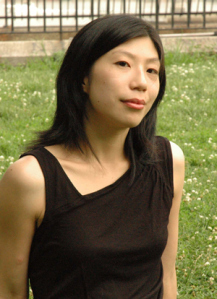 Wendy Lee is the author of the novel Across a Green Ocean (Kensington, 2015), about a Chinese-American family dealing with the immigration experience, long-held secrets, and learning how to forgive. Her first novel, Happy Family (Grove, 2008), was named one of the top debut novels of the year by Booklist. A graduate of New York University’s Creative Writing Program, she has worked as a book editor and an English teacher in China. You can find out more about her on her website, Facebook, and Twitter.
Wendy Lee is the author of the novel Across a Green Ocean (Kensington, 2015), about a Chinese-American family dealing with the immigration experience, long-held secrets, and learning how to forgive. Her first novel, Happy Family (Grove, 2008), was named one of the top debut novels of the year by Booklist. A graduate of New York University’s Creative Writing Program, she has worked as a book editor and an English teacher in China. You can find out more about her on her website, Facebook, and Twitter.

January 21, 2015
Author Interview: Multi-Published Author Sharon Maas Tackles Diversity In Publishing And Writes A Story About A Family Of Women, Healing, and Love
 Today I’m pleased that the insightful and generous Sharon Maas is back with us on Women’s Fiction Writers. Sharon struggled to find a home for her novel that features Guyanese women, a story not set in the US. But she held fast to her belief that “Diversity in publishing seems to be hot at this time, and publishers are waking up to the fact that brown people read too, and white people don���t mind reading about brown characters in foreign countries!”
Today I’m pleased that the insightful and generous Sharon Maas is back with us on Women’s Fiction Writers. Sharon struggled to find a home for her novel that features Guyanese women, a story not set in the US. But she held fast to her belief that “Diversity in publishing seems to be hot at this time, and publishers are waking up to the fact that brown people read too, and white people don���t mind reading about brown characters in foreign countries!”
While it’s not the same thing, in the early stages of getting feedback for The Glass Wives, I an editor told��me no one would read it or understand it unless they were Jewish. (Soooo not true!) That really made me mad and I realized there would always be people who wanted to read only about what and who they knew. Luckily, most people want to expand their horizons through reading, not limit them.��
Sharon Maas deserves your attention. Grab a cuppa, read, and share your thoughts in the comments.
Amy xo
Author Sharon Maas Tackles Diversity In Publishing And Writes A Story About A Family Of Women, Healing, and Love
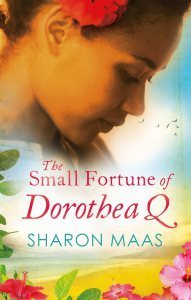 Amy: Congratulations on��The Small Fortune of Dorothea Q! I just love the title of the book. Can you tell us a little about the main characters and the story (without any spoilers)?
Amy: Congratulations on��The Small Fortune of Dorothea Q! I just love the title of the book. Can you tell us a little about the main characters and the story (without any spoilers)?
Sharon: There are three main characters, three generations of women:
We first meet the Dorothea of the title as a cantankerous old lady in a wheelchair, arriving in London to join her daughter Rika and granddaughter Inky. Later in the story we go back to Dorothea���s youth in Georgetown, Guyana, learn of the great tragedy in her life, and find out why she is the way she is.
Inky, the granddaughter, is the first-person narrator for a third of the story; Dorothea gets on Inky���s eighteen-year-old nerves on the one hand, on the other hand she slowly learns respect, and grows curious as to her grandmother���s past. She is also desperate to find out the enormous family secret: why did her mother, Rika, run away from home when she was 16, never to speak to Dorothea again until now?
Rika is a woman of many secrets. By nature introverted and bookish, she is an enigma to Inky; as the story unfolds, we go back to Rika���s own colourful past in Guyana, and learn of her own deep wound.
These three stories intertwine throughout the novel. There���s a lot to be forgiven, and a lot to be understood. Inky tries, and fails, to mediate between her mother and grandmother, but in the end she too has to go back to her family roots in Guyana, learn respect, and solve her own problems.
The ���Small Fortune��� of the title is a tiny heirloom Dorothea has in her possession: a valuable postage stamp. As we all know, heirlooms can bring out the worst in some families, and this is the case here as well! In fact, the stamp ��� a sister to the world famous British Guiana 1 Cent Magenta, the rarest stamp in the world ��� is a McGuffin, driving the plot. On it hinges all the complications between these three women ��� and on it hinges also the story���s resolution.
Finally, it���s a story of forgiveness and healing. A story about the power of love.
Amy: Is your writing style rigid or relaxed? Do you outline? Synopsize? Or write by the seat of your pants?
Sharon: I���m naturally very laid back, and so is my writing style — just like Rika, who is ���so laid back she is practically supine!��� I write ���by the seat of my pants���, as the jargon goes, letting the story come to me as I write. I often feel that the story is already there, all sorted out and perfect, inside me; my work while writing is to dig it out, unclothe it, as it were, reveal it. So I sit myself down, close my eyes for a while to tune into the story, and just write until the whole thing is finished, every day a little.
The revision process is different; it means chiseling away at all the parts that obscure the story, as a sculptor chisels away at stone, and then polishes it; it���s hard work, and I���m always grateful for a good editor. But actually, I love both parts of the writing process, the intuitive, emotional, creative part as well as the hard-nosed, critical revision process.
Though I have confidence in my actually stories, I am never satisfied with my writing; I always feel that words are somehow inadequate. The challenge is always to find the right words to reveal the story as I ���know��� it, so that readers can feel it as strongly as I do.
Amy: The characters are from Guyana and live in London. Is this similar to your own background? Why was London your setting of choice for Rika, Dorothea, and Inky?
Sharon: The Guyana part is very similar. Though I haven���t lived in London, I did spend lots of time with family members in Streatham as a child, and even now many of my friends and family live in the area the book is set in. The house where my characters live in Streatham Hill is the actual home of a friend of mine, where I stay whenever I spend time in London. Then of course there is Brixton Market, which I HAD to bring into the book ��� it���s like an excursion into another world, with all the sights, smells and sounds of the Caribbean! There���s a very dynamic West Indian culture going on in South London, and I really wanted to tap into that energy, and also explore a little bit the experience of first- and second generation immigrants from the Caribbean.
Inky is second generation, who identifies completely with London and actually rejects her cultural roots. Rika has lived there for decades and is well integrated, yet her childhood and youth have made her what she is, a hybrid. And Dorothea is the new immigrant, sniffing out the new territory, critical and slightly homesick.
Amy: I also love the book cover. I think it’s feminine and evocative of a deep story with the face, landscape, and birds. Is this what you envisioned for the cover? Were there other choices?
Sharon: My publisher chose the cover, and I think it exactly captures the flavour of the book; the wistful expression on the girl���s face, the colours, the sense of a faraway country, sun and birdsong, the reflection of a homeland across the seas. There is a sadness in her expression, and she has good reason to be sad���
Amy: How has the writing and publishing experience for this novel differed from the experiences you’ve had before with your other work?��
Sharon: Oh, don���t get me started! I could write volumes on this.
In a nutshell, I was first published by HarperCollins, three novels between 1999 and 2004. I was able to tap into a trend at the time, India. The publisher set me up as a writer of epic Indian novels, as sort of female Amitav Ghosh (we had the same editor).
However, much as I love India, I am not Indian, and lack the background to truly continue writing with that setting, all the nuances needed to truly ���write what I know���. I ran out of inspiration for Indian novels. What I wanted o write were books set in my own background, which is Guyana, an incredibly rich culture with a fascinating history. I fell out with HarperCollins over this. They didn���t want novels set in Guyana, as they though ���Guyana isn���t commercial, readers never heard of it, they won���t read novels set there, blablabla.��� My agent at the time also warned me off Guyana, noting that ���UK publishing is very xenophobic.���
So I just wrote my Guyana novels and had them rejected, four in all. I had a wonderful editor at HarperCollins and kept up my connection to her, and was able to submit to her directly, but I suppose she had her directions. The Small Fortune of Dorothea Q was one of the four. I wrote it back in 2008, and queried that editor. She never replied. I submitting it to agents but they too agreed that ���readers-don���t-like-foreign-settings-except-India���. The only agent who actually read the manuscript was Lorella Belli, who loved it, but thought she couldn���t sell it. So I put it away, biding my time.
Last year, my out-of-print HarperCollins novel Of Marriageable Age was re-released in digital format by the small publisher Bookouture, and I was back in the publishing saddle.
The time, I feel, is right for Dorothea and co. Diversity in publishing seems to be hot at this time, and publishers are waking up to the fact that brown people read too, and white people don���t mind reading about brown characters in foreign countries! I���m so glad I have Bookouture as my publisher ��� an innovative little house that will get my book into readers��� hands. And by a fortuitous turn of events, Lorella Belli is the agent who works with Bookouture for foreign sales, so she is now the agent who will take it to the London and Frankfurt Book Fairs. How fantastic is that!
Amy:��What is your best advice for aspiring authors in today’s publishing climate?��
Sharon: There have never been so many choices in publishing as today; many are going the self-publishing route, while many still yearn for Big Publishing. Both paths carry pros and cons, so it���s important to look past the hype on both sides of the argument and research carefully to find out what is the right path for you and your book. And never forget the third option, which is the one I chose: a small and successful publisher! But always: research, research, research.
Finally, though, it all comes down to the book itself. Forget about getting it published until that time comes, and just write the very best book you can. Put all you have into it, polish it till it shines, and then think about the best way to present it to the world. And have patience; everything worth having takes time. Good luck to you all!
Thank you, Amy, for giving me the mike for a while.
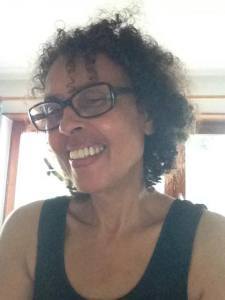 Sharon Maas was born in Georgetown, Guyana in 1951, and spent many childhood hours either curled��up behind a novel or writing her own adventure stories. Sometimes she had adventures of her own, such��as plunging off to discover South America by the seat of her pants, just like Rika in The Small Fortune��of Dorothea Q. She ended up in a Colombian jail, but that’s a story for another day.
Sharon Maas was born in Georgetown, Guyana in 1951, and spent many childhood hours either curled��up behind a novel or writing her own adventure stories. Sometimes she had adventures of her own, such��as plunging off to discover South America by the seat of her pants, just like Rika in The Small Fortune��of Dorothea Q. She ended up in a Colombian jail, but that’s a story for another day.
In 1973 she travelled overland to India via England, Turkey, Iran, Afghanistan and Pakistan. After��almost two years in an Indian Ashram she moved to Germany, got an education, got a job, got married,��had children, and finally settled down. She still lives in Germany after three and a half decades, but��maintains close ties and great love for both India and Guyana; and, somewhat reluctantly, for England.
http://www.sharonmaas.com
http://www.sharonmaas.blogspot.de
www.facebook.com/sharonmaasauthor
@sharon_maas

January 14, 2015
Guest Post: When Is It Time To Consider Yourself A Real Writer?
 It’s a new year. Do you have the same old attitude? Is it time for a shift?
It’s a new year. Do you have the same old attitude? Is it time for a shift?
Are you struggling with whether you’re a real writer? A novelist? An author? Read author Densie Webb’s (and no, it’s not Denise, it’s Densie) account of how bad she had to feel in order to get a place where she could feel better. Many of us have been there. I feel like I’ve known Densie FOREVER, and it’s great to feature her here today, and to celebrate the release of her debut novel, YOU’LL BE THINKING OF ME.��
��And to answer the question “When is it time to consider yourself a real writer?” I’d say: Any time you damn well please.
But that’s just me. ;-)
Please welcome Densie to Women’s Fiction Writers and share your stories in the comments.
Amy xo
When Is It Time To Consider Yourself A Real Writer?
by Densie Webb
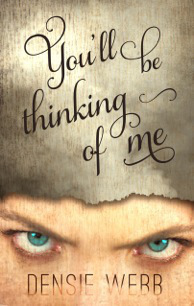 It seems a lot of us writers have a tough time coming to grips with the idea that we are, indeed, writers. It���s a touchy subject, this whole who-is-a-writer business. It���s funny, I���ve always been very comfortable calling myself a writer, because I���ve made my living as one for more than 20 years. But there���s an important distinction that makes it easy for me. I���m a ���freelance writer,��� which denotes work for hire. All those years, I have written mostly non-fiction and mostly about health-related topics. I have also worn an editor���s hat for most of that time. So, I can speak with authority that non-fiction writing takes a certain amount of skill and expertise.
It seems a lot of us writers have a tough time coming to grips with the idea that we are, indeed, writers. It���s a touchy subject, this whole who-is-a-writer business. It���s funny, I���ve always been very comfortable calling myself a writer, because I���ve made my living as one for more than 20 years. But there���s an important distinction that makes it easy for me. I���m a ���freelance writer,��� which denotes work for hire. All those years, I have written mostly non-fiction and mostly about health-related topics. I have also worn an editor���s hat for most of that time. So, I can speak with authority that non-fiction writing takes a certain amount of skill and expertise.
Being a creative writer, a fiction writer, a writer of novels, is something else entirely. And, while being comfortable with any form of the written word helps, it���s only a part of the recipe for being a good writer. To simply say, ���I���m a writer��� connotes creativity.
A couple of years ago, I signed up for an online writing class, thinking it would be good for me to see what others were doing and to get feedback, instead of just having my words rattling around in my own head. I had long since learned that part of being a writer of any kind was developing the thick skin of an armadillo and the wonderful ability to curl up in a ball when input from editors and critiquers got to be too much. Those skills came in handy for this class.
Only two people signed up���me and one other writer. Turned out she was the editor of a literary publication and was well published. The instructor of the class was also a published author, taught at several well-known writers��� conferences and developed the online instruction module for the class. And then, there was me.
So, picture this: You���re timidly dipping your toes in the fiction-writing waters, hoping no one is watching too closely. And then your ���classmate��� dives in head first right next to you and starts swimming laps around you at record speed. The coach starts cheering and handing out medals. Not to you, but to your classmate. Yet, week after week you���re asked to stand on the edge of the pool and dip your toes in yet again, and watch as your classmate swims laps around you.
Well, that���s what the class was like for me. The instructor went positively orgasmic over the other participant���s work, complete with over-the-top praise and exclamation marks! I received what you could call barely contained disdain disguised as ���constructive criticism.���
Which brings me back to the ���who is a writer��� question. The instructor had a very clear literary bent. A low tolerance for popular fiction, which is where my aspirations lie. There���s a truckload of literary snobbery out there, even as popular fiction becomes, well, more popular. In the class, we were given weekly assignments turned in online. One seemed to go against every piece of popular fiction I had ever read. So, in a very diplomatic manner, I sent a passage from a current New York Times bestseller, asking what she thought of it. Her response was something to the effect that much of the popular literature out there doesn���t deserve to be published. End of discussion. That���s when I realized I had signed up for the wrong class.
In all fairness, I learned a lot from that class. But I also realized that we writers are an eclectic bunch. Could this years��� Pulitzer prize winner write a winning Middle Grade or Young Adult novel? Somehow, I think not. Have you every read Frindle by Andrew Clements? It was a favorite of my kids when they were small. I don���t think it would live up to my instructor���s literary standards, but no one could ever convince me that it wasn���t worthy of publication. I���m not a fan of John Steinbeck, but go ga-ga over Edgar Allen Poe. Does my taste in literature make either of them bad writers? I think not.
In Hollywood, an actor who has screen presence is said to have the ���it��� factor. You see them on screen and you just know. The same is true for good writers. You can���t break it down, imitate it, teach it. It���s an elusive essence that just is. But some actors do well only in comedies, some only in romantic comedies, some can���t seem to fake being scared on screen. Does that make them any less an actor? Less versatile, perhaps, but no less an actor.
Around the time the class was wrapping up, my writer���s ego in tatters, I found the encouragement I was looking for in a blog post by Seanan Macquire, author of Feed, writing as Mira Grant. She writes young adult, urban fantasy, modern horror and the occasional romantic comedy. She said she���s been asked when she was going to stop writing what���s ���hot��� and become a real writer and start writing what was in her heart. Her response spoke to me.
���You know what? My heart is full of fairy tales and zombies and blond girls in high heels kicking monsters in the head. My heart is full of snappy dialogue and cinematic tropes and screams in the muggy summer air. I am a real writer. It���s just that what I really want to write about is occasionally the Fighting Pumpkins cheer squad, a hitchhiking ghost with a thing for cheeseburgers, and genetically engineered parasites. And that���s okay.���
So there you have it. Whether it���s bittersweet romance, erotica, mystery, horror, fantasy, paranormal, epic family drama or the great American novel, if it���s what grabs you and won���t let go, then write. There���s room for a lot more of us on bookshelves and Kindle libraries than some literary critics would have you believe.
 Densie Webb���s debut novel, You���ll Be Thinking of Me is the story of a young woman���s serendipitous encounter with a celebrity, a brush with obsessive love, and the bittersweet gift left behind by the very person fixated on destroying her life. Densie���s book comes out today from Soul Mate Publishing and she is proud to call herself a ���real writer.��� While she still spends her days writing and editing stories about health and nutrition, she writes fiction in the evenings and weekends and is currently working on a second novel as well as working with a co-author on a third.
Densie Webb���s debut novel, You���ll Be Thinking of Me is the story of a young woman���s serendipitous encounter with a celebrity, a brush with obsessive love, and the bittersweet gift left behind by the very person fixated on destroying her life. Densie���s book comes out today from Soul Mate Publishing and she is proud to call herself a ���real writer.��� While she still spends her days writing and editing stories about health and nutrition, she writes fiction in the evenings and weekends and is currently working on a second novel as well as working with a co-author on a third.
@dlwebb on Twitter
http://www.densiewebb.com

January 7, 2015
Author Interiew: Debut Author Sonja Yoerg Rises From The Slush Pile After Querying 100+ Agents
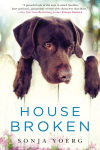 Happy New Year fellow women’s fiction writers and readers. New year, new author. Apropos, right?
Happy New Year fellow women’s fiction writers and readers. New year, new author. Apropos, right?
I’m thrilled to introduce you to Sonja Yoerg, who’s debut novel, HOUSE BROKEN, is a riveting family saga strewn with secrets. It’s deftly told from three points of view, and that’s no easy task! I was impressed by the distinctness of the three voices from three generations. I loved that HOUSE BROKEN is set in the present. I enjoy historical fiction but have just been itching to read a slew of contemporary books, since that’s what I write. HOUSE BROKEN did not disappoint. Plus, look at the face on the cover! How could I resist?
Please welcome Sonja Yoerg to Women’s Fiction Writers and tell us about your journey to publication in the comments. (When I read Sonja’s answers, I emailed her immediately because I’d queried well over 100 agents as well the first time around.)
Here’s to a productive 2015 for us all!
Amy xo
Debut Author Sonja Yoerg Rises From The Slush Pile After Querying 100+ Agents
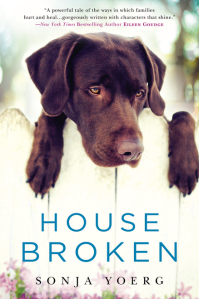 Amy: Sonja, congratulations on your debut novel, HOUSE BROKEN! Since most of us here are writers and authors, can you share a little bit about your personal journey to publication?
Amy: Sonja, congratulations on your debut novel, HOUSE BROKEN! Since most of us here are writers and authors, can you share a little bit about your personal journey to publication?
Sonja: Thanks, Amy! I’m delighted to have the chance to chat with you.
I am one of the rarest of animals: The Creature That Rose from the Slush Pile. It took about a year to go from finished manuscript to signing a book deal. Finding an agent, as everyone knows, was the hardest part. Might as well buy a fistful of lottery tickets, right? I didn’t have an MFA or any connections, and had never attended a conference. I didn’t even have a critique group! (I do, however, have a husband and two daughters who are not only supportive but excellent readers.)
I queried well over a hundred agents. I scrutinized every word in their replies, desperate for feedback. “Not for me,” several wrote. What could it mean? Surely there was a hidden message in those three words. My spirits soared whenever an agent said something nice. I felt like a fool—shouldn’t a fifty-year-old woman have more self-respect?—but there it was. “Look!” I’d say to my husband. “She said I’m a really good speller!” “That’s wonderful, darling.” He might’ve been more relieved than I was when I finally got an agent.
The Call, by the way, came while I was visiting my sister-in-law and her husband in England. Their house was 400 years old and originally served as the library for the manor down the road. The front door was enclosed by a vestibule where patrons could return their books. Talk about scene setting! When Maria Carvainis called to tell me how much she loved my book, I felt the history of written word surrounding me.
I thought I’d be a wreck while my agent was shopping the book around, but I wasn’t. Maria has been an agent for thirty years and I trusted her completely. It was out of my hands, in any case, which was a relief. After a few months, she’d brokered a two-book deal with Claire Zion at Penguin/NAL. These two women have been incredible champions for my book, and I’m grateful. And lucky.
Amy: What sparked the idea for HOUSE BROKEN? Was it a person, place, thing? Did the story arrive fully formed?
Sonja: I started with the main character, Geneva. She’s a veterinarian—and an expert in animal behavior—and rational to a fault. She thinks there’s a reason for everything and won’t let sleeping dogs lie. Once I fleshed out who she was, I set about making trouble for her. I gave her two slippery teenagers, a husband with a lax parenting style and an injured, alcoholic mother whom Geneva must take care of.
I had no idea where the story would lead and didn’t know the ending until I got there. No one was more surprised by this process than I was. Like Geneva, I prefer my ducks in a neat row, so the prospect of setting out to write a story without an outline was terrifying—and fun!
A few chapters in, I decided I wanted to hear from Geneva’s mother, Helen, so I wrote a chapter from her point of view. A couple chapters later, I began writing from the perspective of Geneva’s sixteen-year-old daughter, Ella. It felt right to give all three generations a voice in the family story, although most of the heavy-lifting in the narrative is done by Geneva. She’s the mom, after all.
Amy: I go through a lot of rewriting and rearranging when I draft a novel (especially the first novel)! Is the book that’s published the book you started writing?
Sonja: Yes, but only because I edit as I go, again and again. I can’t leave a clunker sentence behind and tell myself I’ll fix it later. I have to know the color of the dress, the model of the car, the song on the radio, right then. It can’t be put off. If it sounds distracting, it is. I write slowly, at times painfully so. But I don’t know how to do otherwise. The up side is that most of my little darlings get killed before I get attached to them.
Amy: What part of the publishing process surprised you most?
Sonja: Everything. Takes. Forever. Except when it’s due yesterday.
Amy: What’s your best advice for aspiring authors of women’s fiction?
Sonja: There’s so much great advice out there—including right here on your blog, Amy—that I’m not sure I’ve got something fresh. Here’s what I try to do whenever I sit down to write.
First, I attempt to tell the truth. I try to get past what I think I know about people and relationships and life, and find the unfiltered stuff. If I stop reading a book, that’s probably the reason: it’s skipping along the surface too much.
Second, I push to keep it interesting. Readers will stay with you if you keep them on their toes, and it doesn’t have to pertain to the central storyline. New writers might be wary of straying too far or of complicating the plot but, in my view, boredom is the greater danger.
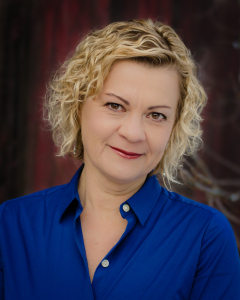 Sonja Yoerg grew up in Stowe, Vermont, where she financed her college education by waitressing at the Trapp Family Lodge. She earned her Ph.D. in Biological Psychology from the University of California at Berkeley and published a nonfiction book about animal intelligence, Clever as a Fox (Bloomsbury USA, 2001). Sonja currently lives in the Shenandoah Valley of Virginia with her husband, and they are often visited by their two college-aged daughter. HOUSE BROKEN is her first novel.
Sonja Yoerg grew up in Stowe, Vermont, where she financed her college education by waitressing at the Trapp Family Lodge. She earned her Ph.D. in Biological Psychology from the University of California at Berkeley and published a nonfiction book about animal intelligence, Clever as a Fox (Bloomsbury USA, 2001). Sonja currently lives in the Shenandoah Valley of Virginia with her husband, and they are often visited by their two college-aged daughter. HOUSE BROKEN is her first novel.
Facebook: https://www.facebook.com/ SonjaYoerg
Twitter: https://twitter.com/SonjaYoerg
Website and blog: http://www.sonjayoerg.com

December 25, 2014
If You Give A Mom A Memory…
A few days ago when I was driving home, I saw something walk across a lawn right around the corner from my house. My thought was vague, yet concise.
That is not a dog.
So I pulled over, made sure my doors were locked, and called the police. I mean, really. I live in SUBURBAN CHICAGO.
The response to my claim that I’d seen a wolf?
“Oh, you mean a coyote? Yes, they’re everywhere.”
I’ve lived here for fifteen years. Never seen one before. Bunnies? Feral cats? Raccoons? Yes. Wolves? Coyotes? No.
Just another reason I’m moving when my daughter graduates college.
But, this blog post isn’t about the safety of my senior dogs in our backyard or even the fact that I’m living here with one foot far out the door. When I was repeating this story to my kids late at night, I remembered another story of unwelcome wildlife. And then I had a realization. With a mouse it might be cookies*, but with a mom, it’s memories. Once you get started, you just can’t stop.
So I’m sharing an old story here (and maybe more in days to come), and a reminder to watch where you step!
Amy xo
Killer Sandals
By Amy Sue Nathan
 “I killed it with a Birkenstock ,” I said, beaming, as l described having whacked a light brown fuzzy tarantula, the size of half a tennis ball, in defense of the bathtub toys. Then I explained how brave with the fortitude of motherhood, I scooped the still beast with a shoe box lid into a shoe box and threw it over the wall into the wash – the wildlife area behind our house in Tucson that was supposed to keep creatures out, not let them in.”You’re not supposed to kill them,” my neighbor said slowly, as if to scold me.She had her hands on her hips and very well may have said we weren’t allowed to kill them, but I tuned her out after “not.” If anything besides my two-year-old and six-year-old were going crawl around that bathtub, I was going to have something to say about it.
“I killed it with a Birkenstock ,” I said, beaming, as l described having whacked a light brown fuzzy tarantula, the size of half a tennis ball, in defense of the bathtub toys. Then I explained how brave with the fortitude of motherhood, I scooped the still beast with a shoe box lid into a shoe box and threw it over the wall into the wash – the wildlife area behind our house in Tucson that was supposed to keep creatures out, not let them in.”You’re not supposed to kill them,” my neighbor said slowly, as if to scold me.She had her hands on her hips and very well may have said we weren’t allowed to kill them, but I tuned her out after “not.” If anything besides my two-year-old and six-year-old were going crawl around that bathtub, I was going to have something to say about it.When I saw that tarantula in the tub, I knew Tucson was not the place for me.
It had been our fourth interstate move in eight years. I relocated with ease – packing and unpacking boxes, driving cross-country, finding schools, kids’ playmates, dry cleaners, take-out Chinese — but acclimating to the desert mentality was a different story. It wasn’t so much the tarantula as the fact that I wasn’t supposed to have killed it. That brought me face to face with reality. I was indifferent to the wildlife around me, and not only was I at odds with nature, but with my neighbors.
I grew up stepping on ants and over cracks, squashing spiders, and spraying bees in the brick cityscape of a Philadelphia row house neighborhood. The view consisted of attached rooftops, telephone wires strewn with Converse sneakers, and a limited sky. In the desert Southwest it was still all gray and brown all around me, but it was nature, not construction. Above my faux adobe home was where the sky wrapped around the world – I was sure of it. Every night magenta and mandarin sunsets cascaded over the western horizon and looked like a water color painting. It took my breath away in much the same way as a childhood game of hide and seek. I knew what was coming, but each time met it with excitement and authentic surprise. If I could have lived there and never looked down to the ground it would have been close to perfect.
Backon the ground ,my neighbors — all transplants from other states — adopted the Southwest as their home. It was never clearer to me than one winter weekend afternoon when from behind the safety of my double-pane, locked windows I watched as the lot of them stood on their driveways in their non-arachnid killing Birkenstocks, riveted, watching as a six-foot snake wriggled up the road. It was not a garden snake. I shook my head as one man swept it to “safety” with a kitchen broom. I swept a dead field mouse – a gift from the dog – out of one of my kitchens years before – but I drew the line at serpents.
While the nights were cool enough for merely a sweater, even in January, we took walks with flashlights, not only because there was nary a streetlight in the Santa Catalina foothills, but because snakes like to take walks at night too, as did the javelina. The black wild pigs also liked to eat out of trash cans and made a mess that would have brought my faraway friends’ suburban raccoons to their knees.
Wildlife sightings were like candy to the adults I knew. They collected their stories of mountain lions sightings on the way to Safeway, and doled them out carefully. Like treasured war stories they were embellished for effect, with the animals getting bigger and closer and more wild in each telling. I always wanted to ask if they drove faster or slower when all that happened, because I knew what I’d do.
Growing up in a city I imagined that “making it” meant you had a front lawn and a back yard and a lawn mower — two other things that eluded my childhood. But the desert landscape twisted my perception. The most expensive homes were the ones with the most rocks and the most varying shades of gray, white and brown. And these desert dwellers adored their sodded quilt square of grass just as we, on our stoops, adored our own measly patches. To me the color of opulence was green. Not dollar green, but grass green, and that didn’t change no matter how many neutral rock gardens I encountered.
I did develop an appreciation for the beauty around me when I learned to see it — the way the dessert bloomed in the fall with orange and yellow flowers sprouting from the gray green saguaro cacti, so in contrast to its smooth skin and verboten spines. The way wildflowers scattered themselves magically across the brown mountainside, emerging from rocky dry soil. I often had to remind myself what month it was, because the desert did not have the same calendar as the rest of the country. The jagged tips of the bordering mountains met the blue sky every day of the year.
But even with the emergent and subtle splendor, I never got used to geckos darting out from nowhere to run across my path, or having an exterminator once-a-month to keep the tiny clear deadly scorpions at bay. It was their home I’d invaded, I realized. How I longed for the familiarity of a crawly black ant to scamper across the sidewalk, and not the microscopic red ones that nipped once at my daughter’s feet and kept her in shoes the entire time she was two.
Living there was a beautiful dream, but I was ready to wake up.
And along with a passion for wildlife came a casual essence that saturated the desert community in an equally ardent way. I realized over and over again, as I dressed my daughter in coordinated outfits to play outside on the playground in late December, that other toddlers looked as dusty as the desert floor and their moms were more hippie than PTO. God, I yearned to be someplace it wasn’t always ok to wear flip flops. I did not see my own reflection in any mom I’d met in the two years we lived there. I began to forget what I looked like.
I raised the white flag. As much as I enjoyed watering flowers in January I was just not the lizard or insect loving kind. I preferred my nature in a vase in the middle of the dining room table. What surrounded me in the desert did not feel natural to me at all.
Months later, while packing boxes for my family’s recoil to life with a fenced-in backyard and snowy winters, a three-inch curled tail reddish-brown scorpion raced across my Saltillo tile foyer. With half of a five-dollar pair of flip flops I smashed it, and then flicked it out the front door to its final resting place among the sandy white rocks. It epitomized my life’s brief desert backdrop.
I told no one, and packed faster.
Slightly edited, but originally published on The Imperfect Parent
*If you don’t know the book If You Give A Mouse A Cookie, you should, whether or not you have kids.

December 22, 2014
Holiday Flashback: A Jewish Mom’s Christmas Poem
You might remember this, you might not. I wrote it quite a few years ago and post it every year, when I remember to do so. And I’m remembering! Hanukkah doesn’t rival Christmas on the holiday scale. Jewish “big” days are Rosh Hashanah, Yom Kippur, and I’d add Passover. But it’s hard to ignore a holiday that’s everywhere, even (or perhaps especially) when it’s not your own. It’s also hard to ignore a holiday that shuts down publishing for weeks.
I’ve always loved the secular Christmas hoopla that surrounds me. And yes, sometimes I covet it. (I don’t have any way or reason to be involved in the religious aspects.) I delight in Christmas in the malls, on the radio, on houses, on plates. I love to drive around and look at Christmas lights, and if someone says, “Merry Christmas,” I say, “Same to you.”
In my opinion, there is nothing bad about this time of year, except that all my network TV shows are on hiatus.
Amy xo

The Gingerbread Mensch
A Jewish Mom’s Christmas Poem
I’ve never had Christmas, it’s to my dismay
As I love all the lights, and the trees and the sleigh
I long for the red and the green M&Ms
There’s a hole in my heart, where a caroler stems
I have a bay window, where a tree would look grand
And not one but two fireplaces, where St. Nick could stand
I would cook up a dinner, put Thanksgiving to shame,
I would revel in guests, endlessly entertain
Yet my heritage dictates, and beliefs coincide
That memories of Maccabees, bring December pride
It’s not a big feast, it’s a festival just
But celebration and eating, are a Hanukkah must
It’s not Jewish Christmas, it celebrates light
And a small and strong army, that fought with much might
Though I love all the fuss, that is Christmas each year
I hold my own holidays steadfast and dear
I do not miss, what I never have had
So when others are puzzled, thinking I’m sad
I assure them I’m happy, it does not take a toll
To watch Christmas pass by, while eating egg roll
I’ll unpack the menorahs, make a final gift run,
Hanukkah here, will be nothing but fun
But I’ll stand at the window, on your Christmas Eve
And watch out for Santa, because it’s good to believe.

December 17, 2014
Author Interview: Multi-published author, Mingmei Yip, Says Sometimes, It Is A Single Word That Brightens A Whole Paragraph
 Once again, we welcome author Mingmei Yip to Women’s Fiction Writers. Her novels come from history, culture, and her passion for her subject and for storytelling. That’s a lesson right there! But her advice to aspiring authors really hits home. Tell me if you agree. You’ll also find the trailer for her new novel at the end of the interview, I hope you’ll take a look!
Once again, we welcome author Mingmei Yip to Women’s Fiction Writers. Her novels come from history, culture, and her passion for her subject and for storytelling. That’s a lesson right there! But her advice to aspiring authors really hits home. Tell me if you agree. You’ll also find the trailer for her new novel at the end of the interview, I hope you’ll take a look!
Please welcome Mingmei Yip back to WFW!
Amy xo
“Sometimes, it is a single word that brightens a whole paragraph”
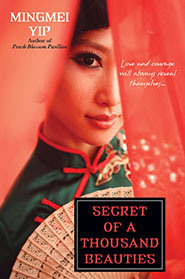 Amy: Many authors have stories in their heads for years before writing them. Can you share with us when the idea sparked for Secret of a Thousand Beauties? And when did you know that “marriage” to a dead man and Chinese embroidery were integral to your story?
Amy: Many authors have stories in their heads for years before writing them. Can you share with us when the idea sparked for Secret of a Thousand Beauties? And when did you know that “marriage” to a dead man and Chinese embroidery were integral to your story?
Mingmei: In traditional China, women were and sometimes still are considered men’s possessions and didn’t have much independence or freedom. A Chinese saying goes “The worst thing that can happen to a woman is to marry the wrong man. The worst thing that can happen to a man is to enter the wrong profession.” Unfortunately, because marriages were usually arranged, many women ended up marrying the wrong man at the cost of any chance for happiness. Wary of a bad marriage, some decided to remain single for the rest of their life. These women would join small communities established for non-marrying women. They displayed this choice by tying up the hair in a long pigtail.
Intrigued by these women and their sisterhoods, I decided to write a novel about them. Most worked as maids, but some were more fortunate and could learn a traditional woman’s craft. One of these was embroidery, an art that has always appealed to me, so I decided to write about this small group of embroiderers. They are supposedly celibate, but of course many succumbed to desire.
Ghost marriage was another way women were oppressed in traditional China. Couples were often betrothed in childhood, or even before birth. Since only half of children survived to adulthood, many lost their fiancés. Because they had already pledged marriage, the cruel custom was to marry the woman to the dead man. As a practical matter, this meant she was a slave to her supposed in-laws.
Amy: You feature Chinese history, heritage, and culture in your novels. Has any of this been handed down to you in stories or is it all imagination combined with research?
Mingmei: I have been influenced by both. Growing up before Hong Kong became the modern city it is today, I heard many stories of China in the days of the emperors, especially from my father, who also loved stories. As soon as I was able to read I started to enjoy learning about the ancient times. However, for each of my novels, I spend a lot of time doing research to get the details right.
Amy: Are you a plotter and planner or do you just write and see where the story takes you?
Mingmei: All my stories have twists and turns but I never plot these in advance but let the story develop spontaneously. Therefore, instead of an outline, I let my characters tell me their stories. Once I start to write, the story grows its own feet and walks where it wants to go.
I begin with an engaging situation. For my debut novel Peach Blossom Pavilion, I decided to write about the last Chinese elegant prostitute. For my second novel Petals from the Sky, I had an idea about a would-be nun who falls in love. My third novel, Song of the Silk Road, is the journey to self-discovery of a young woman who travels the ancient Silk Road in search of adventure – and a three million dollar reward. The next two, Skeleton Women and The Nine Fold Heaven, are about femmes fatales and women spies working for gangsters.
Amy: What’s your best advice for aspiring novelists?
It’s never easy to be a writer, especially when you start out. I think to be a writer, it is still essential to master the basics. Not only voice, characterization, dialogue, plot, but also sentence structure, its rhythm and music. I always try to vary the length of my sentences and start each one with a different subject. It’s essential to spent whatever time it takes to find the right word. Sometimes, it is a single word that brightens a whole paragraph.
“There is a Chinese saying ‘Slap on the thigh and exclaim!’ That’s how the readers will react to a good choice of word. Readers may not be aware of the meticulous hard work behind a smooth sentence, but if you don’t pay attention, they will soon become bored.
“I also think it’s good for authors to attend other cultural activities such as movies, concerts, art exhibitions. Have as diverse a background as you can cultivate, that really helps.”
 Mingmei Yip believes that one should, besides being entertained, also get something out of reading a novel. Her new novel is Secret of a Thousand Beauties, coming out December, 2014 by Kensington Books. Her other novels include: Skeleton Women Femmes Fatales); The Nine Fold Heaven, story of an ex spy and night-club singer undertaking a dangerous journey to look for her long lost lover and son; Peach Blossom Pavilion, story of the last Chinese Geisha; Petals from the Sky — a poignant Buddhist love story about wisdom, compassion, when to persist and when to let go; Song of the Silk Road , an adventure, love story between an older woman and a younger man with a three million award on China’s famous, dangerous route.
Mingmei Yip believes that one should, besides being entertained, also get something out of reading a novel. Her new novel is Secret of a Thousand Beauties, coming out December, 2014 by Kensington Books. Her other novels include: Skeleton Women Femmes Fatales); The Nine Fold Heaven, story of an ex spy and night-club singer undertaking a dangerous journey to look for her long lost lover and son; Peach Blossom Pavilion, story of the last Chinese Geisha; Petals from the Sky — a poignant Buddhist love story about wisdom, compassion, when to persist and when to let go; Song of the Silk Road , an adventure, love story between an older woman and a younger man with a three million award on China’s famous, dangerous route.
Besides writing, Mingmei is accomplished in many other fields. A professional player of the Guqin, Chinese zither, she was recently invited by Carnegie Hall to perform in “A Festival celebrating Chinese Culture” program. She had her solo Goddess exhibition at the New York Open Center Gallery to great acclaim and held calligraphy workshops at the City University of New York and the Metropolitan Museum of Art. She has lectured extensively on Chinese art and culture at Oxford University, Columbia University, Beijing University, University of Paris, Vassar College, Williams College.
Facebook: https://www.facebook.com/SilkRoadRomance.MingmeiYip
Twitter: https://twitter.com/#!/Mingmeiyip
Amazon page: http://www.amazon.com/Mingmei-Yip/e/B0037A8RBO
Goodread: http://www.goodreads.com/author/show/235532.Mingmei_Yip

December 11, 2014
How to Write When You Don���t Have Time (or have had too much egg nog���or Hanukkah gelt)
It���s the most wonderful time of the year, right? It���s cold, wet, gets dark at 4:30, and most of us have no time or energy to write.
Let me explain. We’re entranced during this season.��I don’t even celebrate Christmas, and Hanukkah/Chanukah/Hanukah is technically classified��as a��festival, and while important, it does not, in any way, have the heft of, let’s say, Passover or Yom Kippur, yet it gets all the good press. I digress. There are lights, food, and happy faces. People want to chat. They want to know your plans, about your kids, about your life (which has given way to those Xmas letters). What’s not to feel good about? Don’t forget Christmas decorations. Because lights. Need I say more?
What’s not to feel good about is falling behind on a deadline or a work-in-progress. It’s not bad to take a break. At one point while writing The Glass Wives (which seems like a lifetime ago) I stopped for six months for some life-tending. But if you don’t want to take a break, but feel like it’s time to spend your time on other things, remember that you can’t really write without living your life.
So go live it!
When people would ask me if the characters in The Glass Wives were based on real people, I answered honestly. Yes and no. Did I know people exactly like the characters? No. But were they snippets or truth stirred with pure imagination? Yes. But one of my favorite stories to tell is how one day I was waiting for my daughter to come out of junior high (she’s a college sophomore now) and I saw another pick-up lane mom get out of her car. She was dressed just the way I’d imagined my character, Laney, to dress. So I watched her. I watched the way she walked in her books and the way her coat swayed. I watched her push her long curly hair off her shoulders then scoop it back again. And, creepy as it may sound, every time I wrote about Laney I thought of this woman, this scene. But at that moment, I wasn’t writing a thing. Nor did I take a note, or record a voice memo. I simply had the experience and used it later.
You know, in my writing.
Nowadays I’m working part-time at a friend’s restaurant. Every day I talk to a hundred people if not more. Most are friendly, some are not. A few are rude. Some are in clothes that tell me what their jobs are, like a policeman or road worker (it’s the fluorescent vest that gives it away). Some are in clothes that tell me nothing except that the person cares about style, or doesn’t. I also know that I don’t know much about any of them but that it doesn’t matter because I write fiction. And when it’s time for me to write about something icky — I’ll likely remember the guy who handed me his credit card after holding it in his mouth.
When I want to write about confusion I’ll write about people who don’t leave a tip (I don’t waitress, but please, if someone is cooking your food, delivering it to you, and cleaning it up, leave a dollar on the table).
When I want to write about entitlement I’ll likely try to channel the woman who��is never satisfied, never has enough crackers, or pickles, or mustard, and always wants something free to make up for it.
Maybe if I want a little angst, I’ll write about the bathroom lock that gets stuck every time I’m in there.
Perhaps one of my characters will wear a lovely hat with a purple flower, like a woman I met yesterday. Or maybe I’ll describe the reaction to someone having matzah ball soup for the first time. Or kreplach.
So, in the season of parties and shopping and family gatherings��lies your opportunity to gather up all of the goodness and save it for a time when you do have time to write. When you have a character who requires a joyous demeanor, or an overstuffed belly, or even a Grinchy mood. Or a fancy hat. Or food on his face.
The best part is, no one knows what you’re doing. And you won’t be writing about these people, just your experience of them.
Don’t forget about the feeling you get when you wait in line for an hour, or get caught in a two-for-one sweater frenzy. Don’t forget the excitement of seeing someone you haven’t seen all year���or maybe that’s worry.
Whoever you see and whatever you do, if you need to, just pack away��the pen and the smart phone and enjoy the season. Take it all in, but don’t take notes.�� It will all be there when you need it, ready to be retrieved, and when your belly is filled with food, your calendar is filled with plans, your closets are filled with hidden gifts���hopefully your head will be filling with ideas!

How to Write When You Don’t Have Time (or have had too much egg nog—or Hanukkah gelt)
It’s the most wonderful time of the year, right? It’s cold, wet, gets dark at 4:30, and most of us have no time or energy to write.
Let me explain. We’re entranced during this season. I don’t even celebrate Christmas, and Hanukkah/Chanukah/Hanukah is technically classified as a festival, and while important, it does not, in any way, have the heft of, let’s say, Passover or Yom Kippur, yet it gets all the good press. I digress. There are lights, food, and happy faces. People want to chat. They want to know your plans, about your kids, about your life (which has given way to those Xmas letters). What’s not to feel good about? Don’t forget Christmas decorations. Because lights. Need I say more?
What’s not to feel good about is falling behind on a deadline or a work-in-progress. It’s not bad to take a break. At one point while writing The Glass Wives (which seems like a lifetime ago) I stopped for six months for some life-tending. But if you don’t want to take a break, but feel like it’s time to spend your time on other things, remember that you can’t really write without living your life.
So go live it!
When people would ask me if the characters in The Glass Wives were based on real people, I answered honestly. Yes and no. Did I know people exactly like the characters? No. But were they snippets or truth stirred with pure imagination? Yes. But one of my favorite stories to tell is how one day I was waiting for my daughter to come out of junior high (she’s a college sophomore now) and I saw another pick-up lane mom get out of her car. She was dressed just the way I’d imagined my character, Laney, to dress. So I watched her. I watched the way she walked in her books and the way her coat swayed. I watched her push her long curly hair off her shoulders then scoop it back again. And, creepy as it may sound, every time I wrote about Laney I thought of this woman, this scene. But at that moment, I wasn’t writing a thing. Nor did I take a note, or record a voice memo. I simply had the experience and used it later.
You know, in my writing.
Nowadays I’m working part-time at a friend’s restaurant. Every day I talk to a hundred people if not more. Most are friendly, some are not. A few are rude. Some are in clothes that tell me what their jobs are, like a policeman or road worker (it’s the fluorescent vest that gives it away). Some are in clothes that tell me nothing except that the person cares about style, or doesn’t. I also know that I don’t know much about any of them but that it doesn’t matter because I write fiction. And when it’s time for me to write about something icky — I’ll likely remember the guy who handed me his credit card after holding it in his mouth.
When I want to write about confusion I’ll write about people who don’t leave a tip (I don’t waitress, but please, if someone is cooking your food, delivering it to you, and cleaning it up, leave a dollar on the table).
When I want to write about entitlement I’ll likely try to channel the woman who is never satisfied, never has enough crackers, or pickles, or mustard, and always wants something free to make up for it.
Maybe if I want a little angst, I’ll write about the bathroom lock that gets stuck every time I’m in there.
Perhaps one of my characters will wear a lovely hat with a purple flower, like a woman I met yesterday. Or maybe I’ll describe the reaction to someone having matzah ball soup for the first time. Or kreplach.
So, in the season of parties and shopping and family gatherings lies your opportunity to gather up all of the goodness and save it for a time when you do have time to write. When you have a character who requires a joyous demeanor, or an overstuffed belly, or even a Grinchy mood. Or a fancy hat. Or food on his face.
The best part is, no one knows what you’re doing. And you won’t be writing about these people, just your experience of them.
Don’t forget about the feeling you get when you wait in line for an hour, or get caught in a two-for-one sweater frenzy. Don’t forget the excitement of seeing someone you haven’t seen all year—or maybe that’s worry.
Whoever you see and whatever you do, if you need to, just pack away the pen and the smart phone and enjoy the season. Take it all in, but don’t take notes. It will all be there when you need it, ready to be retrieved, and when your belly is filled with food, your calendar is filled with plans, your closets are filled with hidden gifts—hopefully your head will be filling with ideas!

December 4, 2014
Guest Post: Author Sonia Taitz’s Long, Winding, And Inspiring Road To Publication
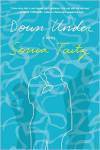 It’s December! Are you slowing down or gearing up? Are you taking inventory of what you’ve accomplished this year or what you’ve neglected? I’d say that amidst the cookies and presents, it’s time to (at the very least) remember that there are many ways to meet (or exceed) writing goals. Sometimes one good, solid paragraph is a major accomplishment. Sometimes it’s a word count. Sometimes it’s simply untangling a plot knot in your head. No matter what, it’s always good to get a little inspiration—and that’s what I offer you today with the introduction of author Sonia Taitz, and her interesting road to the publication of her three novels.
It’s December! Are you slowing down or gearing up? Are you taking inventory of what you’ve accomplished this year or what you’ve neglected? I’d say that amidst the cookies and presents, it’s time to (at the very least) remember that there are many ways to meet (or exceed) writing goals. Sometimes one good, solid paragraph is a major accomplishment. Sometimes it’s a word count. Sometimes it’s simply untangling a plot knot in your head. No matter what, it’s always good to get a little inspiration—and that’s what I offer you today with the introduction of author Sonia Taitz, and her interesting road to the publication of her three novels.
Sonia is honest and funny—key components of author sanity in my opinion.
Please welcome Sonia to Women’s Fiction Writers!
Amy xo
When the Going Gets Ridiculous, the Writing Gets Sublime
by Sonia Taitz
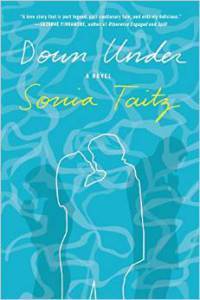 I’m here to send a word of cheer to my valiant fellow writers. In fact, I may be the literary embodiment of the phrase, “where there’s life, there’s hope.”
I’m here to send a word of cheer to my valiant fellow writers. In fact, I may be the literary embodiment of the phrase, “where there’s life, there’s hope.”
I started out young. My first novel, IN THE KING’S ARMS, was written in my 20s – a decade so far away as to now seem mythical. Unless you’re actually in your 20s, in which case you’re probably deeply upset about something, this decade seems like a fairy tale where anything is possible. Every phone call (in my 20s, there were phone calls) and letter (and there were letters) could bring the news that would change the world. Forever. So there I was, shopping a novel, ready for that phone call or that letter.
IN THE KING’S ARMS was, like most first novels, entirely based on my own story. But it was a pretty good story, with a romance at its heart. A child of Holocaust survivors (me, disguised as a girl with different coloring) gets into Oxford University. And although her war-traumatized parents fear her going away, not to mention exceeding them by miles in education, what they dread most is the chance that she’ll fall for a non-Jew. Guess what she does (guess what I did)? In my book, I make the young man an aristocrat from a haughtily anti-Semitic family. On top of which, he wants to be an actor – hardly a Jewish mother’s dreamboat. He’s not even taking pre-med (or optometry) on the side, just in case. No, he’s a rogue, a dropout; he’s not even an Oxford student but the raffish brother of one. And he wants to be a theatre actor, a traveler, part of a troupe. Does this Romeo and Juliet pair end up together? You’d have to read the book to find out. And I’d have to be published for you to read the book. A goal that remained in the air for a while, as you’ll see.
Throughout my 20s, and into my 30s, I discovered that getting published is as fraught with drama as (but far less sexy than) star-crossed love. I even managed to get an agent, a good one – who dropped me after trying three or four publishers. After much struggle, I got another, less prestigious but more persistent agent. This one found me a wonderful independent press. A senior editor at the publishing house, an elegant man in his 60s, announced that I — and my fledgling book –were about to become “a literary event.” A promised cover review in The Washington Post was one detail I recall. I began musing about how many pairs of shades I’d need as I rode the limo from bookstore to bookstore for signings. Then the deal fell through – the publisher told my editor that he’d already acquired a similar book. Goodbye, second agent.
Cut to 25 years later. Let’s call it a quarter century — that sounds even longer and more portentous. At this point, I have actually published a book about mothering, acquired and disappointed a few more agents, and have completed a memoir, THE WATCHMAKER’S DAUGHTER, about growing up as the child of immigrant concentration camp survivors. After one year of dogged searching, I land a big agent. This lady is the best of the best. Her clients are household names, and those that aren’t have the consolation of Pulitzer Prizes and National Book Awards. I remember toasting my luck with a friend. Never toast to the mere fact of getting an agent. Though this luminary loved my memoir, in the end she failed to close a deal. Two promising houses fell through, after taking me agonizingly close to literary consummation. Then this agent, too, sent me on my not-so-merry way. I went away more slowly than I used to. I was older, after all. A manatee streaked with scars, as it were, drifting into the open seas.
At this point, I began looking at small publishers, academic publishers, anyone with a printing press (or a stamp pad). I finally found a tiny publisher, an infinitesimal but good house, run by a husband and wife, who fell in love with THE WATCHMAKER’S DAUGHTER. I meekly asked if they would begin our collaboration with the publication of my novel, that 25-year old bearer of broken dreams, which had fictionalized the memoir story. I had to ask. IN THE KING’S ARMS was my forlorn child. It lived in a dark drawer, but I’d never forgotten it. The editors miraculously fell in love with the novel as well. Without changing a word, it went to press – and came into the world in 2011. Not only did this once discarded manuscript make it to print — it made it into New York Times print; the fiction editors gave it a wonderful review.
A year later, THE WATCHMAKER’S DAUGHTER emerged from the same tiny press, garnering praise from Vanity Fair, People, The Reader’s Digest, NPR and more. Both books, fiction and non, were nominated for prizes (the memoir won a medal from ForeWord, that champion of indie presses). Finally, I felt I had arrived.
Two years later, I am typing on my laptop, addressing my colleagues, my friends, my buddies in the trenches and the margins. I mean you. My new book, DOWN UNDER, was published a few weeks ago, and I hope you’ll read it. It’s not about the Holocaust, but it does have that star-crossed lovers theme. You’d know it was the same author. This time, however, my subconscious carried me along to stranger climes. The story is inspired by famous movie star who went a little crazy and started cursing out Jews, women, and gays. I used to love this guy, so I’ve taken that downturn personally (not to mention the fact that he filmed two movies on my block). The title – DOWN UNDER– gives you a clue as to who it is. OK, he’s Australian, but not Hugh Jackman. His initials are MG. Did you know that MG was born and bred in America? That fact formed the kernel of my tale. The character based on him, a black sheep Irish-American boy, falls into deep teen love with a prim Jewish girl who breaks his heart. Years later, his star in decline, he journeys back to the U.S. to rekindle the flame and/or settle the score.
My little press, sadly, is closing this year. DOWN UNDER will be our last book together. But because of this platform, I’ve had the confidence to go on and look for yet another agent for my next novel. After four years flying solo, I’ve now found one, and she loves the new manuscript I’m polishing for submission. This one (GREAT WITH CHILD) is about an ambitious law associate who gets pregnant by accident. No Holocaust AND no Romeo and Juliet. But sex and love, per usual (including motherhood)? Check.
There’s no telling what will happen in the future. Bigger publication? A little fame flare-up? Disappointment? Some familiar mixture of all of the above? I can’t control the world. I can’t see the path ahead to make sure it’s free of pebbles and sinkholes. Nor can I control agents, publishers, reviewers, or the literary marketplace. There is just one little thing I can control. It’s actually a huge thing.
I can keep on writing no matter what. And I hope you’ll do the same.
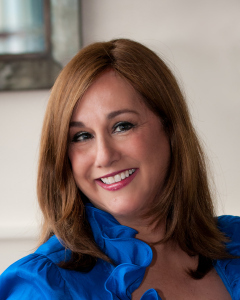 Sonia Taitz is the author of DOWN UNDER, recently published by McWitty Press. Her website is http://www.soniataitz.com.
Sonia Taitz is the author of DOWN UNDER, recently published by McWitty Press. Her website is http://www.soniataitz.com.

Women's Fiction Writers
- Amy Sue Nathan's profile
- 543 followers



